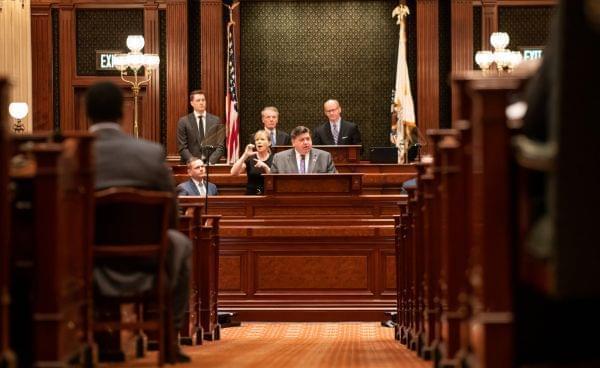In Pritzker’s State Of The State, A Focus On Ethics

Gov. J.B. Pritzker delivers his State of the State address to the General Assembly in this photo provided by the state of Illinois. Handout/Illinois Office of Communication and Information
Gov. J.B. Pritzker used his State of the State address Wednesday to call for a culture change in Illinois government — particularly when it comes to corruption.
Before we get to Pritzker’s big speech, it’s worth pausing to remember the context in which it was delivered. One day before the governor walked onto the House floor, former state Senator Martin Sandoval, like Pritzker a Democrat, walked into a Chicago courtroom and pleaded guilty to federal bribery charges, and lying about his taxes.
“I am deeply ashamed of my actions,” Sandoval told reporters before leaving the courthouse. “I take full responsibility. And I apologize to the people of Illinois, and most importantly the constituents that I’ve served over the last 17 years.”
'We must root out the purveyors of greed and corruption in both parties, whose presence infects the bloodstream of government.'J.B. Pritzker
Without naming him, Pritzker seemed to take direct aim at Sandoval: “We must root out the purveyors of greed and corruption in both parties, whose presence infects the bloodstream of government.”
Pritzker spent a significant portion of his speech on the ethics and culture of Illinois government — about six minutes out of a speech that lasted 35.
“It’s no longer enough to sit idle while under-the-table deals, extortion or bribery persist,” Pritzker said. “Protecting that culture — or tolerating it — is no longer acceptable. We must take urgent action to restore the public’s trust in our government. That’s why we need to pass real, lasting ethics reform this legislative session.”
A bipartisan task force has until the end of March to recommend ideas for changes in ethics law, but Pritzker says he has ideas of his own, including one that’s long been sought by government reformers — and stalled among elected officials.
“Most states have a revolving door provision for legislators, and it’s time for Illinois to join them. Elected officials shouldn’t be allowed to retire and immediately start lobbying their former colleagues. It’s wrong, and it’s got to stop,” he said.
This moment, right here, made an impression on Illinois Comptroller Susana Mendoza. She was in the VIP section at the front of the House chamber, just a few feet from the governor.
“He had a rousing standing ovation,“ Mendoza said later. “So I remember when I was going back to take my seat, actually thinking, in my own head: Well I certainly hope that everybody who just stood up is quick to introduce bills or get behind ethics reforms, and actually passes them, and doesn’t just applaud today and then call it day. Right? We have a lot of work ahead of us, and I think now is the time to seize the moment, and get it done.”
But not everyone is convinced Pritzker has the right ideas. State Sen. Dave Syverson, a Republican from Rockford, does not seem to share Pritzker’s concerns about the revolving door.
“I guess the question is: How do you stop that?” Syverson asked. “Or why would someone be punished for the fact that they were serving in government, which may give them a better expertise on some of these areas?”
Syvverson was among several Republicans who took issue with Pritzker’s framing of the ethics issue as bipartisan.
“We’ve passed ethics reform after ethics reform over the past 20 years. The problem is that we have a large number of — many members that are from his party — that have either been indicted or are under investigation,” he said, adding that Pritzker ought to be calling on Democrats to follow the law.
That said, plenty of Republicans embraced Pritzker’s tough talk on ethics. And some, like House Republican leader Jim Durkin, wishes the governor had gone one step further: “The power that has been built up in this building over decades comes from the person who is writing the maps. Right now that's the speaker of the House of Representatives, Speaker Madigan.”
The “maps” he’s referring to are the gerrymandered legislative district boundaries. Republicans are pushing to have an independent panel draw new maps after this year’s census — which they hope would result in the election of more Republicans and fewer Democrats.
What they’re really asking Democrats to do is give up some of their power.
But what they’re really asking Democrats to do is give up some of their power.
“If we're going to do a thorough power-washing of Illinois government, one of the best ways of doing it is taking that power away from the legislators,” Durkin said.
Now the real work of the legislative session can begin — well, almost. Both the House and Senate canceled Thursday’s scheduled session day, so the real work will have to wait until next week.
You can email Brian Mackey or browse his story archive. You can also follow him on Twitter or subscribe to his RSS and podcast feeds.

